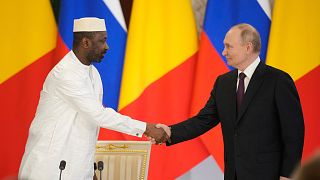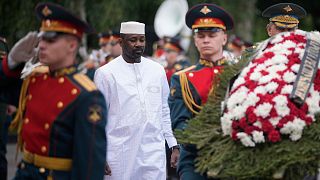Mali
Every night or almost every night, it is the same ritual. Mamadou Haïdara and his wife spend long hours chatting in their darkened living room in Bamako, a capital city that is subject, like all other cities in Mali, to incessant power cuts.
No fan to cool down, no battery for the cell phones... the stifling evenings follow one another, and they have to improvise solutions.
"I bought a lot of fans. I share them with some of my children and with our cleaning ladies," explains Mamadou Haïdara, an executive in the private sector, while waving his new acquisition.
To shorten the ordeal in the cozy house in the Baco Djicoroni neighborhood, the Haïdara family goes to bed early, but the children struggle to find sleep.
The blackouts last at least two hours in this central neighborhood, and sometimes all night. The Haïdara family is among the 50% of Malians who have access to electricity, out of a population of 21.9 million, according to World Bank figures.
Infrastructure is struggling to keep up with population growth, which is growing at about 3% a year, according to the World Bank, in one of the world's poorest countries, much of which is plagued by jihadism and insecurity.
Fed up
At home and at work, the hours seem long when the temperature exceeds 40 degrees during the hot season.
"We spend the whole day together doing nothing, just chatting. It's a discouraging situation. So we are forced to sit around" because of the lack of electricity, laments Ibrahim Konate, head welder in a metal workshop in Bamako.
"It's hard for a worker who leaves home and sees load shedding at work. It's as if we came and went empty-handed," he says.
These blackouts are taking a toll on the economy. "In this hot weather, people need fresh produce. When products are not fresh, customers refuse to buy them. We are the ones who suffer the consequences," said Issa Dicko, manager of a food store.
"People don't have the same temperament. Some customers get angry," said Oumar Yattare, a cashier in a restaurant in the capital.
In the regions of Segou, Sikasso, and Mopti, the inhabitants of several localities have demonstrated in recent months. In Gao, in the north, power outages have lasted several days in a row.
Villages in rural areas often rely on local generators or companies, but in the cities, the national company is the focus of criticism.
The Energy Company of Mali (EDM), nicknamed "Energy of Evil" by some users, is unable to meet the demand for electricity, which is growing by an average of 10% per year, according to the Ministry of Energy.
This is due in part to the fact that the thermal power plants are outdated and consume a lot of fossil fuels.
Untapped potential
A report by the Ministry of Energy in 2019 points to "a very high production cost due to thermal production, which currently leads to a deficit of nearly 50 Fcfa (0.75 euros) on the average selling price per kWh."
Selling its electricity at a loss, the company has accumulated a colossal debt. On March 28, the West African Development Bank (BOAD) agreed to set up a repayment program worth 45 billion CFA francs (about 68 million euros).
The aim is to "ensure the continuity of electricity supply to the Malian population and to support the country's economic and social development", according to the BOAD.
Ultimately, the authorities hope to take advantage of Mali's energy potential, whose hydroelectric and photovoltaic resources are largely untapped.
Users like Mamadou Haïdara are taking their time: "There are advertisements, we are shown convoys of generators, we are told that such and such a power plant is being finished... We are still waiting".













01:52
In Goma, solar power brings light and hope in Ndosho neighbourhood
Go to video
Morocco: United Kingdom withdraws from renewable energy project
11:18
Africa accelerates towards energy and economic sovereignty with DRC mining growth {Business Africa}
02:27
South Africa faces severe power cuts
01:47
How a Cameroonian stove turned recycled oil into clean fuel
Go to video
Mission 300 Africa Energy Summit: Driving Energy Access Across Africa